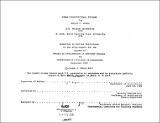Urban organizational systems
Author(s)
Morog, Joseph V
DownloadFull printable version (5.566Mb)
Other Contributors
Massachusetts Institute of Technology. Dept. of Architecture.
Advisor
Horacio Caminos.
Terms of use
Metadata
Show full item recordAbstract
General systems theory provides a conceptual framework for the integration of knowledge from a wide variety of specialized fields. Systems theory serves to synthesize, reconcile, and integrate knowledge making it possible to unify analytical data into broader based theories. By examining various systematic relationships, attention can be focused upon the interrelatedness of organization theory and physical planning. The juxtaposition of these two disciplines within a systems context has particular application in the design of urban settlements in developing countries. The lack of organizational capability and the inability to influence the environment contributes to the continuing cycle of poverty of the urban poor. By structuring and integrating their activities, the poor would be better able to participate in the planning and the implementation of projects which affect their lives. The development of organizational systems can increase the capacity of individuals to change their relationship to the environment to one of greater influence and control. Further, the designs of physical layouts have potential for determining social systems which enhance the idea of interrelatedness.
Description
Thesis (M. Arch.)--Massachusetts Institute of Technology, Dept. of Architecture, 1981. MICROFICHE COPY AVAILABLE IN ARCHIVES AND ROTCH. Includes bibliographical references.
Date issued
1981Department
Massachusetts Institute of Technology. Department of ArchitecturePublisher
Massachusetts Institute of Technology
Keywords
Architecture.